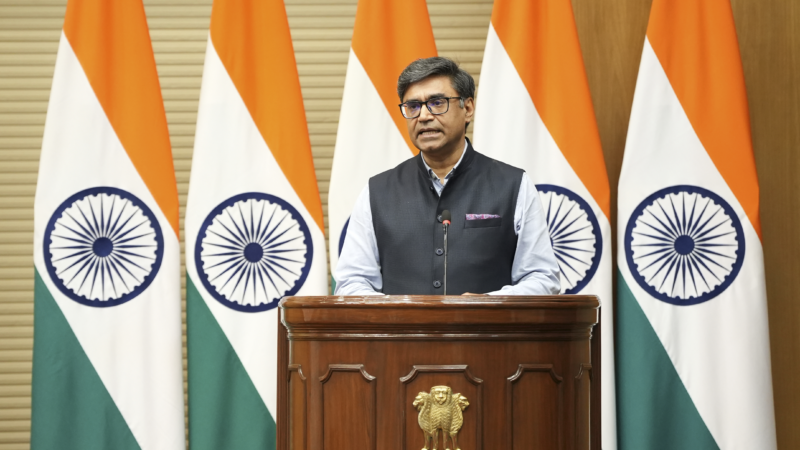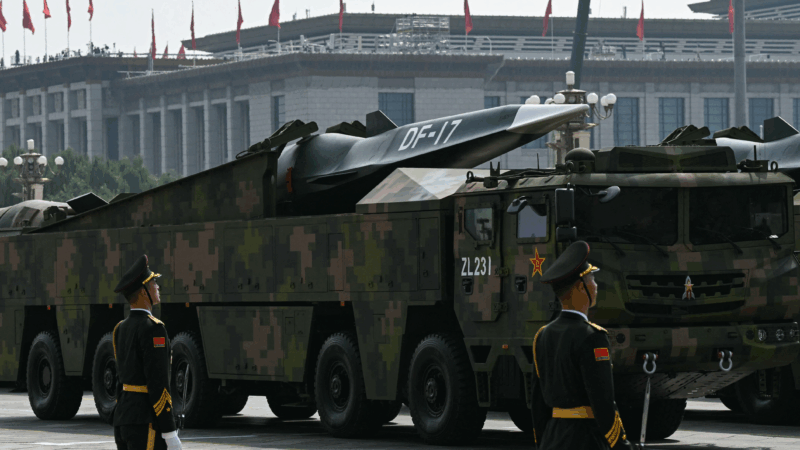India and Pakistan accuse each other of violating ceasefire hours after reaching deal
ISLAMABAD — India and Pakistan agreed to a ceasefire Saturday after U.S.-led talks to end the most serious military confrontation between the nuclear-armed rivals in decades but accused each other of violating the deal just hours later.
The ceasefire had been expected to bring a swift end to weeks of escalating clashes, including missile and drone strikes, triggered by the massacre of tourists by gunmen last month that India blames on Pakistan, which denies the charge. But multiple explosions were heard in two large cities of Indian-controlled Kashmir hours after the countries agreed to the deal.
Indian Foreign Secretary Vikram Misri said late Saturday that “there had been repeated violations of the understanding arrived between the two countries” and accused Pakistan of breaching the agreement.
“We call upon Pakistan to take appropriate steps to address these violations and deal with the situation with seriousness and responsibility,” he said at a news conference in New Delhi. Misri said the Indian army was “retaliating” for what he called a “border intrusion.”
In Islamabad, Pakistan’s Foreign Ministry blamed Indian forces for initiating the ceasefire violation. The ministry said Pakistan remains committed to the agreement and its forces were handling the situation with responsibility and restraint.
“We believe that any issues in the smooth implementation of the ceasefire should be addressed through communication at appropriate levels,” the ministry said.
The first word of the truce came from U.S. President Donald Trump, who posted on his Truth Social platform that India and Pakistan had agreed to a full and immediate ceasefire: “Congratulations to both Countries on using Common Sense and Great Intelligence. Thank you for your attention to this matter!”
Pakistani Prime Minister Shehbaz Sharif said in a speech Saturday that his country agreed to the ceasefire in the larger interest of peace in the region and hoped all the outstanding issues with India, including the long-running dispute over the Kashmir region, would be resolved through peaceful dialogue.
Misri said the head of military operations from both countries spoke Saturday afternoon and agreed “that both sides would stop all firing and military action on land, and in the air and sea.”
However, hours after the agreement, explosions heard by residents in Srinagar and Jammu in Indian-controlled Kashmir were followed by blackouts in the two cities. There were no immediate reports of casualties.
Omar Abdullah, the region’s top elected official, said in a post on social media: “What the hell just happened to the ceasefire? Explosions heard across Srinagar!!!”
Working toward a broader agreement
Conflict between India and Pakistan is not rare, with the two countries having periodically engaged in wars, clashes and skirmishes since gaining independence from British India in 1947.
The ceasefire in the latest hostilities came after the countries fired volleys of cross-border missile strikes Saturday, when India said it targeted Pakistani air bases after Islamabad fired several high-speed missiles at military and civilian infrastructure in Punjab state. Pakistan said it responded with retaliatory strikes.
U.S. Secretary of State Marco Rubio said he and Vice President JD Vance had engaged with senior officials from both countries over the past 48 hours. They included Indian Prime Minister Narendra Modi and Sharif, India’s External Affairs Minister Subrahmanyam Jaishankar and the Pakistani Chief of Army Staff Asim Munir.
Rubio said the two governments agreed to “start talks on a broad set of issues at a neutral site.”
Though Pakistanis had initially celebrated their army’s retaliation, they were later jubilant about the truce, saying it was a moment of national pride and relief after days of tension.
In Islamabad, Zubaida Bibi expressed her joy at the restoration of peace with India.
“War brings nothing but suffering,” she said. “We are happy that calm is returning. It feels like Eid to me. We have won.”
Indian strikes hit Pakistani air bases
Tensions have soared since the attack at a popular tourist site in Indian-controlled Kashmir left 26 civilians dead, mostly Indian Hindu tourists, on April 22.
Before the ceasefire was reached Saturday, India’s military held a press briefing in New Delhi, saying Pakistan had targeted health facilities and schools at its three air bases in Kashmir.
“Befitting reply has been given to Pakistani actions,” Indian Col. Sofiya Qureshi said.
Indian missiles targeted Nur Khan air base in the garrison city of Rawalpindi, near the capital Islamabad, Murid air base in Chakwal city and Rafiqui air base in the Jhang district of eastern Punjab province, according to Pakistan’s military spokesman.
There were no immediate reports of the strike or its aftermath from residents in the densely populated Rawalpindi.
Pakistan’s military had said it used medium-range Fateh missiles to hit an Indian missile storage facility and air bases in the cities of Pathankot and Udhampur. Army spokesman Lt. Gen. Ahmad Sharif said the country’s air force assets were safe after the Indian assault.
The Associated Press could not independently verify all the actions attributed to Pakistan or India.
Explosions in Indian-controlled Kashmir
After the announcement of Pakistani retaliation, residents in Indian-controlled Kashmir said they heard loud explosions at multiple places, including the large cities of Srinagar and Jammu and the garrison town of Udhampur.
“Explosions that we are hearing today are different from the ones we heard the last two nights during drone attacks,” said Shesh Paul Vaid, the region’s former top police official and Jammu resident. “It looks like a war here.”
Vaid said explosions were heard from areas with military bases, adding it appeared that army sites were targeted. Residents living near Srinagar’s airport, which is also an air base, said they were rattled by the explosions and booming sound of jets.
“I was already awake, but the explosions jolted my kids out of their sleep. They started crying,” said Srinagar resident Mohammed Yasin.
Omar Abdullah, Indian-controlled Kashmir’s top elected official, welcomed the ceasefire. But he said had it happened two or three days earlier “we might have avoided the bloodshed and the loss of precious lives.”
U.S. unexpectedly adds 130,000 jobs in January after a weak 2025
U.S. employers added 130,000 jobs in January as the unemployment rate dipped to 4.3% from 4.4% in December. Annual revisions show that job growth last year was far weaker than initially reported.
Greetings from Mexico City’s iconic boulevard, where a dog on a bike steals the show
Every week, more than 100,000 people ride bikes, skates and rollerblades past some of the best-known parts of Mexico's capital. And sometimes their dogs join them too.
February may be short on days — but it boasts a long list of new books
The shortest month of the year is packed with highly anticipated new releases, including books from Michael Pollan, Tayari Jones and the late Nobel laureate Mario Vargas Llosa.
Shootings at school and home in British Columbia, Canada, leave 10 dead
A shooting at a school in British Columbia left seven people dead, while two more were found dead at a nearby home, authorities said. A woman who police believe to be the shooter also was killed.
Trump’s EPA plans to end a key climate pollution regulation
The Environmental Protection Agency is eliminating a Clean Air Act finding from 2009 that is the basis for much of the federal government's actions to rein in climate change.
The U.S. claims China is conducting secret nuclear tests. Here’s what that means
The allegations were leveled by U.S. officials late last week. Arms control experts worry that norms against nuclear testing are unraveling.







